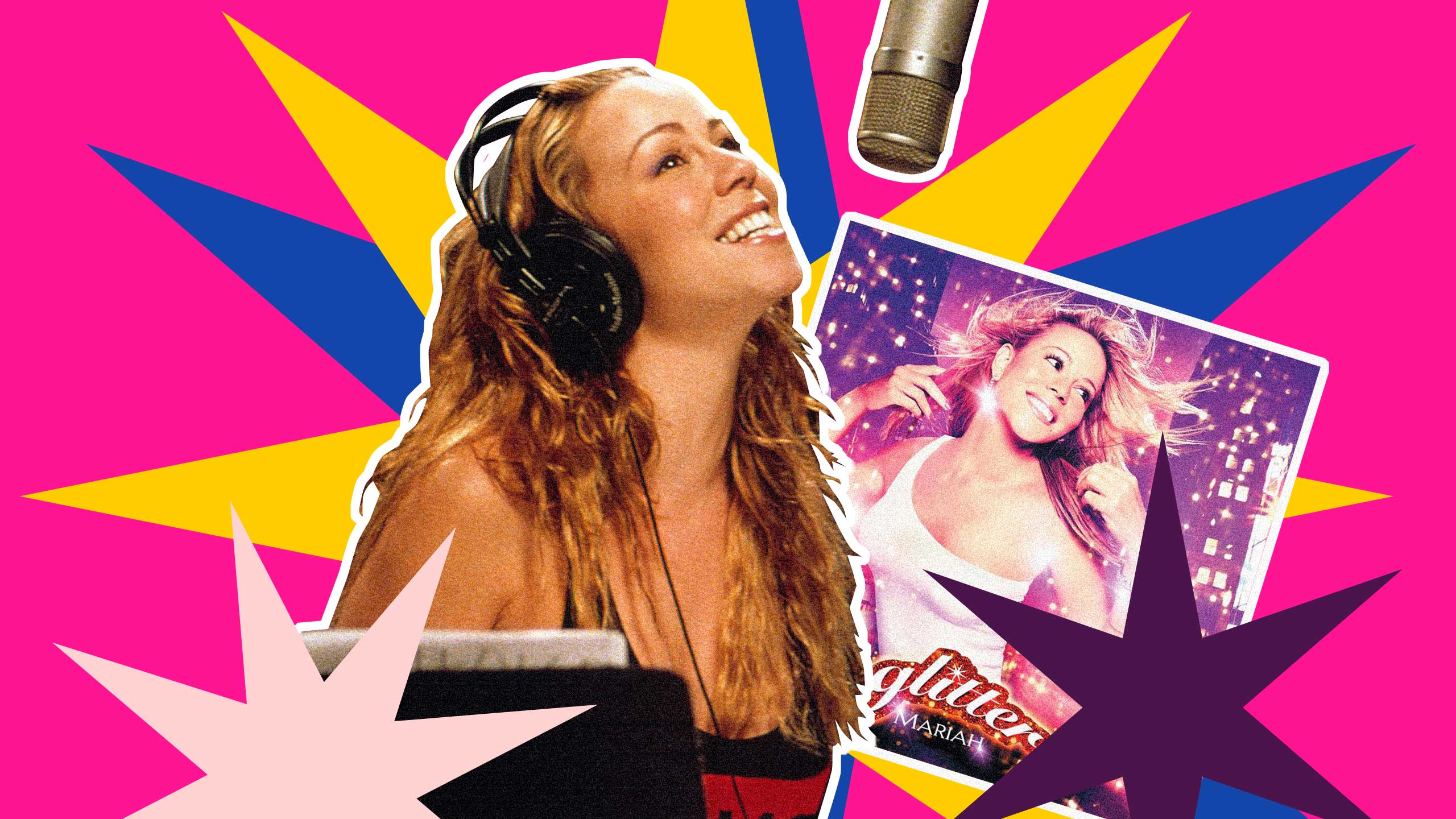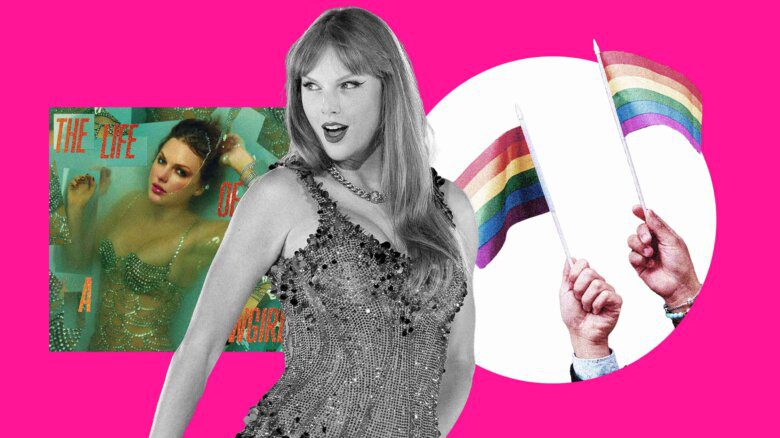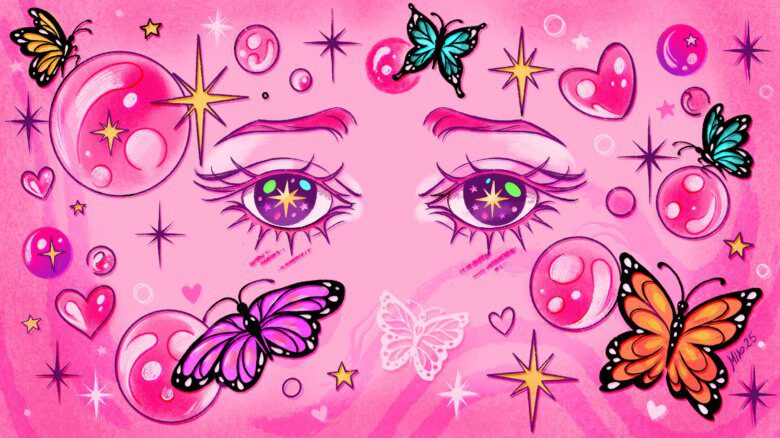Sep. 11, 2001 changed the world as we knew it. But in a bizarre twist of events, that day would also turn one mega pop star’s hugely successful career upside-down.

Credit: Jimmi Francoeur/CBC; Brian Wong/Xtra
Yes, Mariah Carey released her eighth studio album, the ill-fated but iconic Glitter, that day. The album served as the soundtrack for the elusive chanteuse’s film debut of the same name. In the film, Mariah plays Billie Frank, an aspiring pop singer-songwriter—it’s basically the same plot as A Star Is Born. Glitter was Mariah’s first project with her then new label, Virgin Records. Under her previous label, Sony/Columbia—headed by her controlling ex-husband, Tommy Mottola, whom she divorced in 1998—Mariah became the most successful recording artist of the 1990s, racking up 14 number-one hits on the Billboard Hot 100 (she now has a total of 19 number ones, second only to The Beatles) and selling more than 100 million albums worldwide. In 1995 alone, Mariah spent 24 weeks at number one between her hits “Fantasy” and “One Sweet Day.”
At the time, the new five-album deal with Virgin was one of the most lucrative in music history, worth a reported USD$80 million. Expectations were extremely high for the queen of number ones. They were not met. Glitter the album and Glitter the film were critical and commercial bombs. Bad enough, in fact, to make Virgin drop and buy out Mariah’s contract for a cool $28 million. For years, she wouldn’t even acknowledge Glitter, referring to it as “the G-word.”
Now, 20 years later, the time has come for us to re-evaluate the film and album, to understand the pop culture landscape of 2001 and the series of unfortunate events that lead to the brutal and unfair tearing down of a pop queen.
Tranna: In her brilliant memoir, The Meaning of Mariah, Carey writes: “The saga of making Glitter was a collision of bad luck, bad timing and sabotage.” Let’s start with the bad timing, which relates to Mariah’s interesting choice of the word “collision.” Here’s the wild timeline of Glitter’s release: On July 26, 2001, while in the midst of promoting the project, Mariah was hospitalized for extreme exhaustion. She stayed in the hospital for two weeks. (All of this, by the way, is detailed in her memoir. I love the book so much, but that chapter is a bit hazy and the details and circumstances aren’t super clear. What’s clear is that it’s a bleak, difficult moment in Mariah’s life.) Because of the hospitalization, the release of Glitter the film was delayed by three weeks, moving from Aug. 31 to Sep. 21. The album’s release was also delayed, from Aug. 21 to… Sep. 11. Bad timing and bad luck. Here’s the wild part: someone on Twitter unearthed a clip of a news report about a woman named Sara, who worked at the World Trade Center. She was late to work that morning and missed the attack because she was out buying a copy of the Glitter CD! Glitter saved Sara’s life! The universe sabotaged Glitter and Mariah Carey in order to save Sara’s life!
Thomas: That is unhinged! I don’t know what is more bizarre: the serendipitous delay of the album release, Sara’s story or the fact that you know so much about what Mariah was going through at the time. It’s not a secret to you that I am definitely not a Mariah fan (Céline Dion for life!), but I recognize how important the Glitter flop era was to her career. Without it, she would never have had the redemption that followed in the mid-aughts—and I live for a diva’s redemption story! I guess she fell harder because she reached such heights in the ’90s. She was everywhere! No elementary school talent show was complete without a 12-year-old girl singing “Hero” to a floor of mostly uninterested children. Her brand back then was really about power ballads. But if I had to pick, I would rather dance to her biggest ’90s R&B hits: “Fantasy,” “Heartbreaker” and “Honey.”
Tranna: In so many ways, 9/11 symbolized the end of the hope of the ’90s. The decade, while not without its own horribleness, felt like one of progress, possibility and prosperity. It all ended that day.
Thomas: The Sep. 11 attacks also ended the era of Y2K prefabricated pop as we knew it. Gone was the fun, innocence and carelessness associated with the Backstreet Boys, *NSYNC, Christina Aguilera and Britney Spears. That fall 2001 marked a change in culture: the internet was definitely on the rise, The Strokes led a NYC garage-rock revival and CD sales would soon plummet thanks to Napster and Limewire. But for me, the 9/11 era is also synonymous with my discovery of club culture. I was 16 and dating my first boyfriend at the time (that relationship lasted only six weeks); he introduced me to one of the great loves of my life: nightlife. I went to my first rave on the Friday before 9/11. It was in an industrial loft building in downtown Montreal and the space was packed with party goers dancing to what was then called “breakbeat,” a genre of electronic music influenced by the 1980s. On Saturday morning, I remember watching the sun rise from the top floor terrace. There, I found my tribe: ravers, club kids and hipsters into electro. As the world got darker in the weeks and months that followed, I embraced that darkness by going out every weekend and ingesting copious amounts of drugs.
Tranna: So much of the way the world exists today is because of that horrible day—the radical political divide between the left and right, the uptick in Islamophobia, anti-immigration policies, etc. And maybe I’m reading too much into the symbolism, but it’s interesting how Mariah’s career, an emblem of the ’90s, was also ruined that day. There’s actually a video showing the Twin Towers engulfed in smoke behind a billboard advertising Glitter. At one point, a still from the video became the main image of Glitter’s Wikipedia page and the subject of a New York magazine piece. I don’t even know how to articulate my feelings about the image, but it is so mesmerizing, evocative and darkly funny. It’s outrageous but also perfectly illustrates the delineation of life before 9/11 and what came after. It should honestly be in a museum.
“I like an element of danger from my pop idols and I just never got that from Mariah.”
Thomas: I’m obsessed with the post-9/11, early 2000s aesthetic: the exposed midriffs, pierced belly buttons, bright, tacky colours, bucket hats and plastic as fabric. The look was sex meets technology.
Tranna: The red carpet at Sunday’s MTV VMA’s awards honestly looked like an early 2000s fashion revival/retrospective. That style is back!
Thomas: Another iconic yet bizarrely prescient image of that time was the Justin Timberlake cover photoshoot for British magazine Arena Homme+. Shot after his breakup with Britney Spears, these images were supposed to be Justin’s introduction as a more mature and sexual older “man” (he was 20 years old!). Shot by Madonna’s pal Steven Klein, the magazine cover was initially supposed to be this “burnt” picture of Justin wearing a muscle tee adorned with a United States flag, with fake blood trickling down from his nose. The magazine came out right around 9/11 but was instantly pulled out from the shelves because some critics claimed the image was anti-American, and there really was no room to criticize American imperialism at the time. The magazine was reprinted with a new, less violent image on the cover, but some of the photos inside are pretty intense. As you know, I’m obsessed with magazines and I still have my copy of that issue with the less controversial cover. I was in high school when it came out and I was completely obsessed with these pictures of Justin—I believe that was his prime! I like an element of danger from my pop idols and I just never got that from Mariah. She is such a gifted vocalist, and just seems too polished to me.
Tranna: I agree that Mariah is pristine. She doesn’t like to have her hair messed, and she notoriously travels with her own lighting crew. Joking aside, Mariah could not have had worse luck. Historically, she has placed the larger part of the failure of Glitter on the events of 9/11. But had the album and film been released as planned, I don’t think the reception would have been any different. Mariah released an album every year during the ’90s and I think she was oversaturated. What bothers me is that she’s not given the recognition she deserves for her success; there was always this inherently misogynistic perception that Tommy Mottola was the genius behind her. To this day, many people don’t realize that Mariah actually writes and produces all of her songs—that’s why, when she’s interviewed about her career, she always starts every sentence by saying “As a songwriter….” It’s funny that she does that, but it also speaks to the deeply entrenched misogyny of the music industry and the way it rarely takes female artists seriously. Of her record-breaking 19 hits, the only one she didn’t write was a cover of “I’ll Be There.” Mariah’s artistry has always been undermined, firstly, because of her beauty and marriage to Tommy and later, because of her over-the-top diva persona. As a songwriter, I believe she’s up there with Lennon/McCartney and Carole King.
Thomas: As much as I was never a Mariah stan, you definitely opened my eyes to the artistic juggernaut that she is, penning all those number ones. This is why she really is in a league of her own, even though in the ’90s, she was always pitted against Céline Dion and Whitney Houston by the press.
You are right that her sexualized image definitely contributed to the media not taking her seriously as an artist, and I salute the lambs for always bringing this up in every conversation about Mariah. But go on: Why does Mariah’s first major flop matter 20 years later?
“If the Glitter soundtrack had been a monster hit, Mottola would have had to face the fact that he did not single-handedly make Mariah Carey.”
Tranna: This leads me to the “sabotage” part of the Glitter equation. Mariah details in her memoir that only the album was being released by Virgin Records: “The film was being produced by Columbia Pictures, which was owned by Sony, which connected it to Tommy.” Mariah alleges that Tommy was able to use his power at Sony to ruin the project, namely by constantly changing the script and cutting out the darker, grittier elements. Mariah writes: “[Tommy] was furious when I cut the strings he used to manipulate me. There was no way he would allow me to have a huge success after leaving him and Sony…. He would have me destroyed before I exposed that he was no magician. If the Glitter soundtrack had been a monster hit, he would have had to face the fact that he was not omnipotent, he was not indispensable, he did not single-handedly make Mariah Carey.” The project was sabotaged and that’s a big part of why I think it deserves a second chance.
Thomas: Right. Queers live for this kind of drama, but it sounds like she’s just making excuses for that cycle flopping! Flop eras are interesting because they are an opportunity for fans to really stick with their idol and go against the tide. Female artists who have experienced incredible highs can always count on their queer fandom to navigate the lows. It’s fascinating to see how certain albums, like Madonna’s Erotica or Lady Gaga’s Artpop, have become fan favourites. Kylie Minogue’s biggest hit, “Can’t Get You Out Of My Head,” which also came out in September 2001, was released after a few years in relative obscurity in the U.S., long after her 1987’s smash “The Loco-motion.” Sometimes, the mainstream needs a flop era as a palate cleanser, and Glitter was just that. I should remind readers that Mariah had one of her biggest hits ever in 2005 with “We Belong Together.”
Tranna: Glitter came out during peak Britney and Christina. And peak Jennifer Lopez, who Mariah maintains she still does not know! The infamous Mariah and J.Lo feud started because of Glitter. For “Loverboy,” the lead single, Mariah was going to sample Yellow Magic Orchestra’s “Firecracker,” but Tommy passed the sample along to J.Lo’s producers, who used it on “I’m Real,” forcing Mariah to re-write “Loverboy.” (That song sampled “Candy” by Cameo instead.) Honestly, that was a blessing in disguise. Last year Mariah released the original “Firecracker” version of “Loverboy” on Rarities. It’s fun but not amazing. The “Candy” version is much better.
“Straight guys probably never feel ridiculous when they bring up sports stats at a dinner party, so I probably shouldn’t shame you for having a favourite version of ‘Loverboy.’”
Thomas: You are such a NERD! You sound like my dad when he rambles on about Pink Floyd. But I get it: it’s harder to geek out about Britney or Céline albums because they don’t write their music and aren’t as invested in the artistic process as Mariah. But I’ll give it to you, geeking out over pop releases and Rarities is a big part of being a queer millenial! Straight guys probably never feel ridiculous when they bring up sports stats at a dinner party, so I probably shouldn’t shame you for having a favourite version of “Loverboy.”
Tranna: This is truly the shit I live for! Mariah was only 32 in 2001, but she had already been around for 10 years and was starting to be regarded as a legacy artist in the same league as Madonna and Whitney Houston. I don’t think there was really a way for her to successfully compete with the new batch of 2001 pop girls. What’s interesting about the mega deal with Virgin Records is that, like any artist who’s been around for more than five years, Mariah’s album sales, while still strong, were not what they were during the first half of her career. In 1997, Butterfly sold half of 1995’s Daydream, and 1999’s Rainbow sold half of what Butterfly did. Glitter wasn’t as big a failure as people made it out to be.
Thomas: Come on, don’t try to tell me Glitter wasn’t a flop! I mean, most pop fans couldn’t name you one song off of it. It’s her first album without a number one. And I’m saying this out of love. It’s okay to fail! We should normalize flops.
Tranna: But “Loverboy” reached number two—it’s ridiculous to call a number two song a flop! I want to talk a bit about the album because I think it’s actually brilliant. It’s in my top five Mariah albums. Glitter, the film, is set in New York City circa 1983, and you can hear the influence of that time period throughout this album. I think the way Mariah was able to take those ’80s references and samples and make them sound fresh and very of the moment was smart and sophisticated. This is largely due to the fact that Mariah worked with producers like Rick James, Jimmy Jam and Terry Lewis, who all defined the ’80s. Mariah has said that recording the album and getting to work with all the amazing producers who made the music of her childhood was a dream come true. I think Glitter was a bit ahead of its time musically. In 2003, everyone in pop was referencing and sampling the ’80s. I love her cover of InDeep’s “Last Night a DJ Saved My Life.”
Thomas: I’ll give it to you, that cover is good. Your knowledge about Glitter is terrifying, but do go on.
“The thing that makes me laugh the most about the movie is that it’s set in early-’80s New York, but the movie looks like it’s set in 2001.”
Tranna: As for the movie, it really is terrible. But for me, it’s up there with Showgirls and Mommie Dearest as far as cult classics beloved by a queer audience go. Glitter is pure camp. And Mariah is actually a good actress! She was so good in Precious and I wish she was given more opportunities to do work like that. She is not the problem with Glitter; the terrible, cliché-ridden script and the awful director were the problems. The movie has absolutely no style. There are these ridiculous, dizzying aerial shots of New York City constantly used as transitions. The thing that makes me laugh the most about the movie is that it’s set in early-’80s New York, which is such a distinct time and scene aesthetically, but the movie looks like it’s set in 2001. There is nothing ’80s about this movie at all! Mariah just looks like her gorgeous 2001 self—they didn’t do any ’80s hair or makeup on her, so the whole thing is just this ridiculous anachronistic mess.
Thomas: I only saw the movie once, with you, and I agree that the lack of ’80s references for a movie set in the ’80s is almost an accomplishment. I mean, she can’t blame Tommy Mottola for this! But you are right that it’s a shame that Mariah was never cast in anything after Precious considering how good she was in that movie. At this point, I think it falls on Ryan Murphy’s shoulders to give The Gays a Mariah vehicle. American Horror Story: Glitter! Maybe we should campaign for this!
Tranna: I would seriously love that. American Horror Story: The Revenge of Billie Frank! In 2018, the Lambily (Mariah’s devoted fan base, made up of self-proclaimed Lambs, like me) started the #JusticeForGlitter movement—okay, “movement” is probably too big of a word. Basically, Mariah’s fans rallied to purchase Glitter on iTunes and get it to number one, which we accomplished. It allowed Mariah to finally embrace and even celebrate the cult campiness of Glitter and that makes me so happy. On her last tour, she even did a medley of songs from the album. I think for a long time Glitter unfairly and cruelly turned Mariah into a joke, which is a sentiment that still seems to linger today. Outside of the Lambily, I don’t know how many people take Mariah seriously and understand just how much of a true artist she really is. Granted, it doesn’t help that she has made Christmas her entire brand identity. While Glitter may not be the greatest showcase of Mariah’s artistry, it’s a funky album that has stood the test of time better than most of the pop that came out of 2001. And the movie is a romp! During these very dark times, we could all use a little glitter.
Thomas: A little glitter, and the definitive Christmas song of our time. As a basic gay, I obviously live for 1994’s “All I Want For Christmas Is You” (the 2011 version with Justin Bieber is TRASH), though I find this song is best enjoyed between May and September (the Nov. 1 memes are getting OLD!). I used to throw dance parties pre-pandemic, and my favourite thing to do was to play the song to a packed bar at 2 a.m. on a hot summer night and cut the sound on the chorus for the crowd to sing along. The song might be a corporate Christmas playlist staple now, but us queers can definitely take credit for making it #1 for the first time ever—in 2019.
At the beginning of the column, I said that I am not a Mariah fan. That still holds. But I am completely obsessed with her 2009 cover of the Foreigner ballad “I Want to Know What Love Is.” The saccharine production, the corny patriotism of the music video (CGI shots of her singing with a gospel choir in the middle of Yankees Stadium—come on!) and her raspy vocals make it one of my favourite Mariah tunes. This cover helped me appreciate how ridiculous and over-the-top she is. Mariah is probably in on the joke and that’s what makes her a legend.
Tranna: What makes her a legend is her ability to persevere and make it through the rain, dahling! Now go rewatch Glitter please.
Montreal-based comedians Thomas Leblanc and Tranna Wintour’s podcast Chosen Family streams on CBC, Apple and Google; new episodes drop every other Thursday.



 Why you can trust Xtra
Why you can trust Xtra


